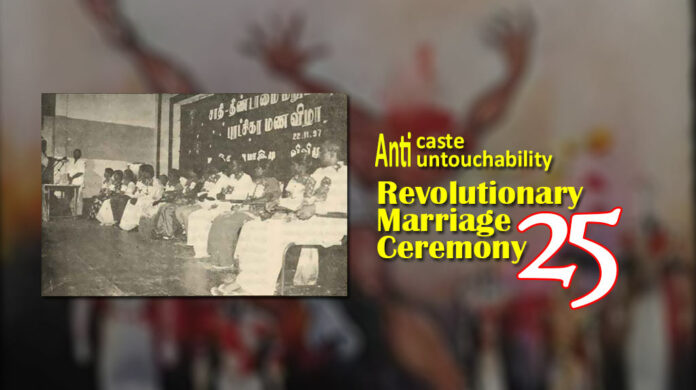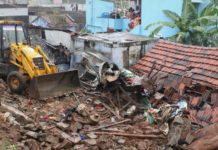It is not possible for today’s younger generation to know in such detail about the caste riots of 1997 in the southern districts. The film Karnan spoke about the Kodiyankulam riots. It was a atrocity that took place in the first phase of Jaya’s rule. Before the horrors of that caste-based atrocity faded, the dominant caste fanatics, especially the Thevar caste fanatics, staged a major riot over the naming of the bus after Veeran Sundaralinganar, the General of the freedom fighter Veerapandiya Kattabomman. Prior to that, Murugesan, who contested and won the panchayat president’s election at Melavalavu, along with some dalits were brutally killed in broad daylight; this was also staged by the dominant caste fanatics.
A three-month-long movement was launched from September to November 1997 on behalf of revolutionary organisations against these caste-untouchability atrocities. Protests against caste and untouchability were carried out in various forms, such as the agitation for the taking water from public wells, the temple entry agitation, and the struggle to wear slippers on the streets. As a part of this, revolutionary marriage ceremonies were also held for the annihilation of caste and untouchability.
The existence and rigidity of caste is bound up in the endogamy system. Matrimonial relations established in the society based on Manusmriti allows marriages only within the same caste. Those who violated it were branded as ‘Chandalas’ and as committers of the most heinous sin of all sins, and were put to death. Even today, you must have heard the elders in the villages scolding them as ‘Adei Chandala Paavi’ (Hey Chandala). To that extent, the cruelty and roots of caste have permeated the minds of the people.
The same Chandala slur and heinous murders that hounded those who rejected caste and married in love are being staged today in the name of ‘honour killings’ by the dominant caste fanatics across the country. Therefore, revolutionary organisations have been planning and staging these revolutionary marriage ceremonies from the very beginning, claiming that one of the ways of eradicating caste is the self-caste – untouchability denial revolutionary marriages. In 1997, during the anti-caste – anti-untouchability movement, seven couples in Villupuram were served a beef feast by organizing a caste-untouchability denial, revolutionary marriage ceremony.
We have presented this article as a reminder to the readers that commemorating the 25th anniversary of these caste-untouchability denial revolutionary marriage ceremonies in the wake of brahminical fascism unfolding its tyranny, will help us to sharpen the spirit of our struggle against fascism.
000
Today, it is customary for many people to talk in public as “Who looks into caste these days?”. If you converse with them a bit more, they will say that caste cannot be annihilated. Now that the RSS Sangh parivar gang is staging its fascistic devilish rule with the support of the Union government, caste associations are gaining momentum. Especially in Tamil Nadu, the Sanghi mob, which is trying to gain a foothold, has correctly identified its place in the caste associations and is promoting them. In that aspect, the Vanniyar caste party PMK naturally becomes an ally of the Sanghi mob. It was during the rule of the AIADMK, a dirty party, that various caste riots, including the Kodiyankulam riots, were unleashed by the rulers.
Can caste denying people stage these caste riots? Thus, a situation where it is not possible to say “who is looking into the caste” exists; and fascism is spreading its darkness through the caste system. It is only in Tamil Nadu, where the reformed and amended Marriage Act is in force, that the Madurai bench of the Madras High Court has delivered a judgment questioning the Act; The verdict was that only marriages with caste-rituals and customs would be recognized.
Perhaps because the court itself is violating the law, the Chidambaram Dikshitars have started protesting for the recognition of child marriage within their caste as an ‘age-old custom’. How did the Dikshitars get this courage to knowingly break the law and fight? Or have the Dikshitars decided that the common law for the people does not apply to them? The Dikshitars, who refuse permission to sing in Tamil at the Chidambaram temple, are going to the next level of their reactionary act. The democratic rights of the people can never be attained without fighting. The self-respect marriage law was earned through fighting.
More than 95 years ago, Periyar, in the name of reformed marriage, rejected the brahminical rituals all over Tamil Nadu and arranged simple life contracts without any luxuries and expenses. But they did not have legal sanction. In 1968, during the DMK rule, these marriages were given the legal recognition of self-respect marriages by the then Chief Minister Annadurai. But today the court has delivered a reactionary ruling questioning the law.
It is at a time when brahminical fascism is spreading its octopus arms in all the arenas, that the commemoration of the revolutionary marriage ceremony, which took place as part of the anti-caste anti-untouchability movement, becomes important.
000
The revolutionary wedding, which was scheduled to take place on November 7, 1997, was postponed due to various reasons; and it took place on November 22. One of the reasons was the delay in finding the brides for the ceremony, as revolutionary wedding ceremonies were held from time to time in many areas by our organization comrades. A total of seven couples’ marriages took place. It was remarriage for two of the female comrades. The difficulty of the marriage ceremony arrangement can be understood from the fact that the parents of more than half of the brides did not turn up for the wedding.
How can we understand the peculiarity that exists in Tamil Nadu, where the revolutionary marriage ceremony, especially remarriage, rejecting caste-untouchability and brahminical reactionary rituals, is not yet accepted in the society? Periyar conducted such life contract ceremonies across Tamil Nadu for more than 70 years; but why were these not normalized? The fact that society has not yet naturally transcended the narrow circle of self, his family, his surroundings is a slap in the face; and we need to accept it.
Also Read: ‘Twitter 2.0’ – Propaganda Machine of Fascists!
When a our comrade was working as a teacher in a college, his family tried to get him married to the daughter of a high court judge. For the judge’s family, a man who has completed an engineering degree, especially a post-graduate in engineering, is needed; and the judge’s family had decided to pack them up to the US once they get married. Our comrade categorically refused to accept, as it was purely treason to leave the country and because of class differences. When the judge tried to convince our comrade by saying that the judge had a simple agrarian class background, our comrade said “let it be true; but the woman was the daughter of a judge” and refused, citing class mismatch.
It’s a typical model of how the families think. At the age of 39, when the comrade, who was associated with our organization, married a divorced Dalit woman in his relative’s village, the father refused to attend the marriage; instead he viewed that the marriage defamed him.
The family of the local comrade also refused to come, saying that the marriage arrangement was to defame their family. In Trichy, when the talks for marriage of a female comrade was going on at home, the family consulted a CPM cadre. The CPM man stopped the family by saying that all these marriages without ‘thali’ and rituals were ‘invalid’. He delivered his own judgement that day.
But today, without comrades from any organization, the younger generation is naturally getting married across castes, some of which end up in honour killings. There is no problem for our comrades because our revolutionary organization gives protection to the comrades. But the struggles continue after marriage. During these revolutionary marriages, they take a pledge that they will fight as a family for social change. The comrades practically show that this is not a mere admission. No matter from which class they come from, they not only naturally recast themselves to the simple proletarian way of life, but continue their struggles for the emancipation of the proletariat.
If they start compromising in their family life, it also resonates in the revolutionary process of the emancipation of the proletariat and goes against the adopted policy. This applies to our organization also. Marx’s answer to the question of ‘what happiness is’ is ‘struggle’. It is easy to write but it is not easy to live through the struggle. Now many of the comrades in the organization are living such simple lives and hard struggle. The senior comrades are fighting with their heirs in order to convince them and make them accept their ideology.
Also Read: Morbi Bridge Collapse: A Massacre of Gujarat Model!
It is a struggle to admit their children to school as there is no mention of caste or religion. Many intellectuals still refuse to accept this and argue. It is a great struggle for a person who is struggling to create a society devoid of caste, creed or class, to live in this casteist society by denying caste. A simple woman worker, who works as a construction worker, had come to do some construction work in the rented house of our woman comrade. As our comrade was friendly, the woman worker drank water from our comrade’s home; During lunch, when she asked about the caste of our comrade, and when the woman comrade said that they did not have a caste or religion, the worker started fighting angrily and asked “Then, will you marry your brother”. The conversation broke down when the comrade asked, “As if you’re going to do it”. The above incident shows that there is caste here even for exchange of food and water.
Even when the comrades fight and go to jail, this caste fight does not stop. Holding a stick, the question will come up, “What is your father’s caste then?” If you are alone, a lathi charge is certain. You have to fight every moment against the horrors of Brahminical fascism and Manu. In general, the horrors of caste cannot be seen so openly in the city. But that’s only a superficial view.
How do we understand the casteist killings in Villupuram at the time of the World Tamil Conference in Madurai? It is the castes which claim to be BC and MBC for reservation benefits in the society boast themselves as the ‘Kshatriya Dynasty’ and the ‘Aanda Parambarai’ (Once Rulers) in the society.
Also Read: Imperialism at a dead end! It’s time for the world proletariat to take the lead!
In the same Villupuram, when the anti-caste anti-untouchability revolutionary wedding ceremony was held, the large hall was overflowing and the crowd absorbed the wedding speeches without any fuss. A driver who stopped the truck to have tea not only listened to the speeches till the end but also supported us with funds. A woman cleaning the hall became eager to listen to the speeches and began to pay full attention. The success of this wedding ceremony could be seen in the fact that after the meeting was over, she approached our comrades and asked them “There is a girl in our house too; will any of your comrades marry?”
Beef feast needs no mention. Today, the Sanghi mob is staging vigilantism in cow belt areas; but this was not a problem in Tamil Nadu at that time. But the fact is that it cannot be said that all the relatives who attended the wedding were at the beef feast. It is also an undeniable fact that many of the relatives who had come, tasted beef for the first time.
No one in our organization has the fantasy that brahminical fascism will fall in an instant. There is no denying of the fact that the root of brahminical fascism has penetrated deep; even into the cuss word ‘chandala paavi’. The judgment of the Madurai Bench of the Madras High Court reaffirms the same in other words. The need for revolutionary marriages against caste-untouchability becomes even greater when the horrors of brahminical fascism prevail today as saffron-corporate fascism. The achievement of the revolutionary and democratic forces lies in transforming these into a everyday phenomena. Endogamy preserves the roots of caste and untouchability. Let’s pledge to continue these struggles until caste – untouchability is smashed!
![]() Asuran
Asuran










